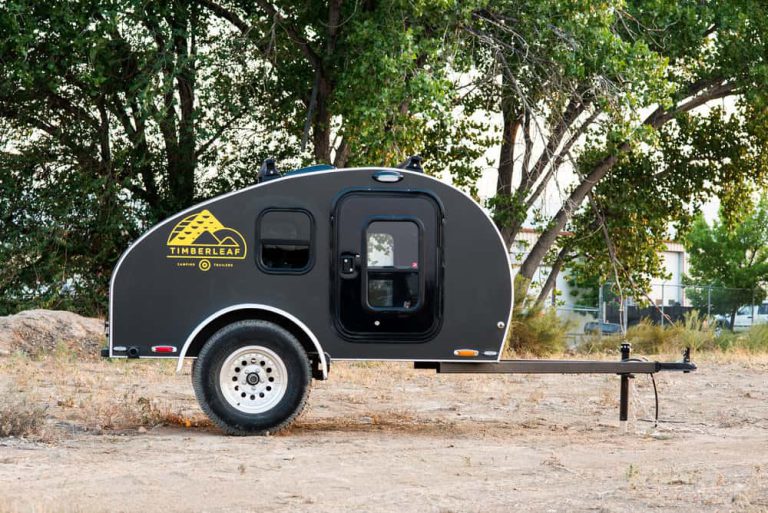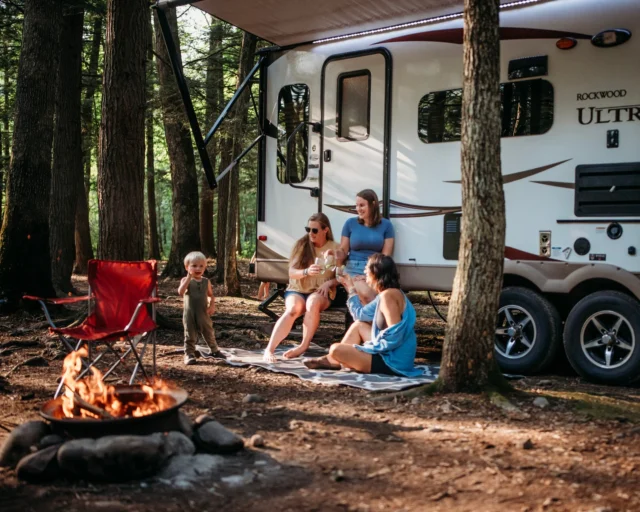

Most RVers already know that good things come in small packages. After all, even the largest and most luxurious rigs are a lot smaller than the average sticks-and-bricks home.
But if you’re looking to get really tiny, look no further than the micro camper. These small, lightweight camping contraptions give campers the option to navigate down narrow roads into off-grid wilderness paradise, all without having to invest in a big, heavy tow vehicle (or expensive motorcoach).
Generally weighing in at less than 1,000 pounds and often custom-built by their owners, microcampers are where innovation and travel savviness meet. It’s all about getting your basic needs met on the road without taking on a major weight or monetary investment… and while it’s a different experience from traditional RV camping, it’s got the same spirit of individuality and adventure.
Not sure if micro camping is for you? In this post, we’re going to walk you through all the basics of this specific type of camping mania: what micro campers are, why they’re so popular, and even how to DIY your own if you decide it’s a travel lifestyle you’d like to try out.
We’re about to dive headfirst into all things small, so buckle up and get ready!
What is a Micro Camper?
Here’s the thing: unlike other RV types, like Class A or Class C, for instance, “micro camper” refers to a whole wide range of vehicle types. Converted VW vans count as micro campers (or technically micro motorhomes), as do tiny teardrop trailers, some truck-bed models, and more.
Since micro campers are growing in popularity, some manufacturers have taken on the challenge of designing models available for consumers. But the history of micro camping is one of invention: the majority of micro campers were designed and hand-built by regular people who were hungry for adventure but not so much for the steep travel budget that goes along with it. They’re also a great answer to the common conundrum of wanting to tow a trailer, but not having access to the kinds of large, tow-capable vehicles most trailers require (like a one-ton truck), or the desire to purchase or drive one.
Who Are Micro Campers Made For?
Micro campers are perfect for people who don’t mind doing things a little on the smaller side. Though they do generally require some sacrifices as far as space and luxury are concerned, micro campers offer a wealth of value in the way of navigability, affordability, and adventure.
Here are some campers for whom a micro camper might work well.
- The rugged individualist. If you’re the type to go it alone, and whose idea of a great Saturday morning involves less sitting at brunch and more scaling mountains, a micro camper might be the perfect recreational vehicle for you. Its versatility and lightweight nature mean you can get out to the deep wilderness destinations that capture your heart, and after all, when you travel solo, you don’t need a whole lot of room. Bonus points if you’re handy and willing (or even eager!) to get into the DIY spirit of these trailers. Designing your own from scratch gives you total control over your micro camper’s features, but even if you buy one pre-made, having the know-how to do on-the-fly repairs can make a huge difference.
- Close couples. Micro camping trailers don’t have a lot in the way of space… but if you’re traveling with your sweetheart, who’s looking to make more space in the first place? Micro campers are a great option for lovebirds who are taking romantic trips to reconnect — or even just to get to know each other better.
- The tent-camper looking for an upgrade. If you usually camp in a tent, even a teeny tiny travel trailer is going to be a significant upgrade. It all comes down to one word: mattress. (Okay, maybe two words: real mattress.) For those who generally take to the road in tents, a micro camper is a great way to step up your vacation game.
- Remote nomads. If you’re the type who’s literally always on the road — and you’re not looking to make your life as cushy as possible — micro campers have two really great perks: they’re lightweight (and thus easily towable behind whatever vehicle you probably already have), and they make “stealth” camping in crowded cities a bit more possible. (I mean, chances are if you street park your micro camper for too long in one spot, you’re still going to get talked to… but not as quickly as you would if you did so with a fifth wheel travel trailer!)
- The deal-seeker. If you’re the type who’s always willing to make some sacrifices in the name of a great deal, a micro camper is a great way to save money on your travel habit. Because they’re small and lightweight, they don’t guzzle fuel in the same way larger RVs do, and since you can park them just about anywhere, you’ll probably save a heap on campsite accommodation fees, too. (Psst: looking for a way to save money on your vacation no matter what kind of rig you’re traveling in? Consider purchasing a Passport America membership, which will lop a full 50% off your campsite fees at almost 1900 campgrounds across the country!)
DIY (Do It Yourself) Micro Camper
As mentioned above, many micro campers are actually DIY jobs — that is, rigs that have been built from scratch, or modified, by their owners. Some of the best micro campers fit this description because doing it yourself gives you as much control as possible over the final outcome of your camper, deciding which features matter enough to take up space and weight, and which you can do without.
Another great perk of building your camper yourself: price! Although pre-built micro campers are generally less expensive than their larger cousins, they’re still a WHOLE lot more costly than what you get if you do it yourself. Some clever travelers have put together micro camper setups for as little as $1,000, and $10,000 could get you a super-luxurious version (whereas prebuilt models of teardrop trailers might start at around $20,000).
If building a camper from scratch sounds totally overwhelming to you, we get it… but it’s honestly not that hard, and a lot of people have done it before! You need a few basic, high-quality ingredients to get started, such as:
- A small trailer frame
- A deep-cycle battery
- Running lights
- A brake lighting kit
- Structural supports
- Wall material (plywood with siding is a good option)
- Roof materials
- A door
You’ll also, of course, need a blueprint and at least a little bit of know-how… or the gumption to go out and find it. Fortunately, plenty of people who’ve built their own trailers have chronicled their adventures online!
The 5 Best Micro Campers You Need to See!
All this talk about micro campers, in theory, is great. But there’s nothing quite like seeing some for yourself to get a better sense of what life would be like if you traveled in one! Here are some micro campers to check out while you’re considering adding this experience to your collection of RVing adventures.
Pre-Built Micro Campers
Here are some commercially available micro campers to check out — and which you can purchase as-is, if you like how they function and don’t want to deal with DIYing it!
1. Timberleaf Trailers

Specializing in tiny teardrop campers, Timberleaf Trailers offers two micro camping options: the Classic Teardrop and the Pika, both of which are small enough to be towed behind a wide range of small SUVs and even some sedans. The classic weighs in at 1500 pounds dry, whereas the Pika is scaled down to just 1,025 for the base model. It also features an upgraded suspension and lift package to make the most rugged camping environments accessible, including offroad adventures you wouldn’t dare take on with most other trailers.
2. Hiker Trailers

Want all the convenience of a custom-built design without all the legwork? Hiker Trailers might just have your number. This company puts together custom-made tiny trailers for its customers, with some base prices starting as low as less than $3,000.
Choose from a wide array of setups and then specify your exact features and build type. Best of all, the company has not one, but two manufacturer locations (one in Denver and one in Indianapolis), so picking up your brand-new baby doesn’t have to be quite as much of a hike… not that you’re not going to want the excuse to take your first adventure with your new micro camper anyway!
3. Tiny Camper Company

Their name says it all! Tiny Camper Company is invested in doing just one thing, and doing it as well as possible: creating tiny teardrop trailers that are an absolute dream to camp in. Many of their models feature a chic vintage design, and you can purchase upgrades directly from the manufacturer — like roof racks and pump faucets — to customize your build to your liking.
Tiny Camper Company offers a wide range of vehicles that start in the low $3,000 range. If you’re looking for something that looks as good as it camps, these tough little trailers are a great option.
DIY Micro Campers
Prebuilt commercial options are cool if you’re looking to get on the road as quickly as possible. But if you’re looking for inspiration to build your rig from scratch… well, we’ve got you covered on that front, too. Here are some of our favorite examples.
4. Dustin & Kim’s $800 Micro Camper

Listen, money isn’t everything… but man is it hard to argue with a price tag as low as $800! Using a reused cargo trailer, reclaimed wood, and a whole lot of ingenuity (and elbow grease), this couple put together this stunning little 40-square-foot trailer for less than $1,000. That’s pretty insane, right? They also did it in just three weeks! ?
5. A DIY Far-Out Ride

We’ve been talking a lot about micro trailers in this post, but converted vans count as micro campers, too! We’re especially impressed with what Isabelle and Antoine at FarOut Ride were able to put together from a plain-old Ford van… and their website has an extensive “van build” section that will let you see how they got it done each and every step along the way.
We have to say, the finished product is stunning and absolutely perfect for this nomadic couple’s travel dreams. What’s more, the overall cost and labor is shockingly low, considering that similarly-outfitted pre-built Sprinter vans often go for over $100,000; the couple spent just over $21,000 and between 600-1000 hours of labor. But it was a labor of love!
Why Micro Campers are Perfect for Short Road Trips
Still not convinced a micro camper is for you?
Well, if you’re planning to full-time or you’re looking for a luxurious vehicle for your next getaway, maybe not — or at least not all the time.
But a micro camper is a pretty darn perfect vehicle for a short road trip. After all, chances are you just need to get where you’re going as quickly as possible and then go explore; when you only have a couple of days, you don’t have much time to waste!
That means you won’t be wasting any of your precious time sitting around inside your RV or watching TV, either. You’ll likely only be at your campsite to sleep, or maybe to share some s’mores around the campfire. Either way, a micro camper makes for a great home base: it’s affordable, easy to tow, and gets all your basic needs covered without any excess baggage.
Here are some great road trips that might be perfect for micro camping:
- Wanna Get Out of Here? Quick Weekend Getaway Ideas
- Gorgeous Drives to Check Out in Every State
- 5 of America’s Most RV-Friendly Destinations
You could also take your micro camper to a local state park or even on a national park tour. Be sure to check out the best campgrounds in your area to help you make a decision!
Micro Camper FAQs
Let’s finish out this post with some answers to the most frequently asked questions about micro campers.
What can tow a micro camper?
Being able to tow without having to invest in a large truck is one of the most attractive parts of this particular RV style for many campers. But what, exactly, can tow a micro camper?
Well, the answer varies depending on both the camper itself and the tow vehicle in question. While sedans generally aren’t built with towing in mind, some can haul up to 1,500 pounds or so, and many micro campers weigh in at less than 1,000. However, you should always check the factory tow capacity of your vehicle against the weight of the trailer before you make an assumption that it’s small enough; towing something outside of your car’s capacity is dangerous and can also void your insurance coverage.
Are micro campers affordable?
Yes! Of course, price points vary; you can spend tens of thousands of dollars on a fancy pre-built one or cobble one together for less than $1,000 like Dustin and Kim did. But either way, you’re looking at a much more affordable experience overall than you would be with a larger RV or travel trailer.
Micro camper vs. RV or normal camper: what’s the experience like?
There certainly are some differences between these two experiences, which you can probably tell just from looking. When you travel in a micro camper, you are giving up a lot in the way of space and luxury… but you’re also gaining a lot in the way of flexibility and ease of travel!
For instance, in a large RV, you might be able to curl up on the couch and watch TV or whip up a whole Thanksgiving dinner in the onboard kitchen. But if you’re really camping for the adventure, how likely are you to take on those two activities, anyway? A micro camper gives you just the basics: a place to sleep, maybe some small kitchen facilities. The rest, you can go ou and find… and have fun doing so, too.
Why are micro campers so popular?
Well… read the post! Micro campers are a great way to enjoy a flexible, affordable road trip and traveling in one opens up the world of RVing to people who might not have otherwise been able to do so. They can also make it possible to reach wilder places that require navigating down roads are innavigable to larger rigs. In short, they’re popular bceause they’re awesome.
Can you rent a micro camper?
You sure can! When you rent on the peer-to-peer market, you’re not limited to just Class A and Class C motorhomes like you are with the big box guys. Our trusted network of renter-owners offer rigs of every shape, size, and footprint for rent, including micro campers. Click here to see what RV rentals are available in your area today!
This post may contain affiliate links.






